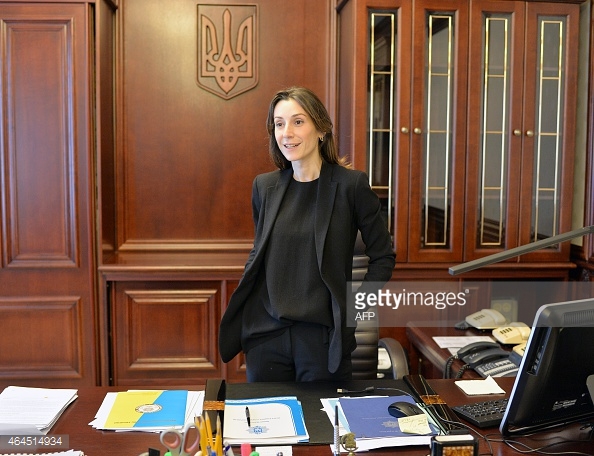
Ukrainian Government Enlists Georgian Talent
Publication: Eurasia Daily Monitor Volume: 12 Issue: 105
By:

President Petro Poroshenko and the government of Arseniy Yatsenyuk have invited a significant number of foreign experts to take up government posts and design the reforms in Ukraine. Appointing and naturalizing foreign officials to such an extent is unprecedented in the post-communist, post-Soviet countries of Central and Eastern Europe. It helps to fill gaps in Kyiv’s own capacities to plan and implement the overdue reforms.
This is a technical exercise with ultimate geopolitical stakes. Its outcome will determine whether Ukraine becomes a consolidated, Western-oriented state, or a dysfunctional one sliding back into Russia’s orbit. The second Yatsenyuk government, installed in December 2014, employs these foreign officials. They have met the legal requirement of taking up Ukrainian citizenship and are no longer “foreigners” in a legal sense in Ukraine.
Within this contingent, several Georgian officials stand out, mainly in the law enforcement and justice sphere. They had served in president Mikheil Saakashvili’s government (2004–2012), are working in Ukraine now, and were joined by Saakashvili himself in an advisory capacity in Kyiv (see below), before he took over as governor of Odesa province (see EDM, June 2, 4). The 2012 regime change in Georgia halted the reforms in that country, particularly in law enforcement and justice. However, the results achieved up to that point have inspired Ukraine’s new leadership to invite some of the authors of Georgia’s reforms to Kyiv.
Ekaterine Zguladze-Glucksmann is first deputy minister of internal affairs of Ukraine. She was Georgia’s first deputy internal affairs minister in 2006–2012. Along with the then-minister Vano Merabishvili, she supervised Georgia’s police reform that earned universal acclaim. In Ukraine, Zguladze is mandated to reorganize the municipal and traffic police, first in Kyiv and then countrywide, under the overall jurisdiction of Interior Minister Arsen Avakov. On June 4, President Petro Poroshenko commended Zguladze’s performance in his annual state-of-the country speech in the parliament (Unian, June 4).
Davit Sakvarelidze is deputy prosecutor-general of Ukraine. Sakvarelidze was chief prosecutor of Tbilisi and first deputy prosecutor general of Georgia in 2008–2012. There, he cracked down successfully on corrupt officials and organized crime (he earned the nickname Commissar Cattani, after the anti-mafia fighter in the eponymous Italian television serial). In Kyiv, Sakvarelidze is designing the reorganization, personnel policies, and introduction of best practices in the Ukrainian General Prosecutor’s Office, according to the agency’s chief, Viktor Shokin (Ukrinform, Channel 5 TV, April 8, 20; RBK Ukraine, June 5).
Gia Getsadze is deputy minister of justice of Ukraine. In Georgia, he was an advisor to then-president Saakashvili, a partner in a law firm and, in 2013–2015, dean of the law school at the State University in Tbilisi. In Ukraine, Getsadze chairs the justice ministry’s committee on the reform of the court system. He is also in charge of anti-corruption action and personnel issues in the ministry. Getsadze heads a small team of Georgian advisors under Justice Minister Pavlo Petrenko’s overall jurisdiction (TSN, May 19).
Alexander Kvitashvili is the minister of healthcare of Ukraine. With a background in public health management, Kvitashvili was Georgia’s health and social affairs minister in 2008–2010 and rector of the State University in Tbilisi in 2010–2013. Although most hospitals in Georgia were privatized, Kvitashvili recommends postponing the privatization in Ukraine until corruption schemes are eliminated and the hospitals are refurbished to attract investors. Reform in this sector is stalled as the Verkhovna Rada has yet to adopt the necessary legislation (Kyiv Post, March 21; Ukrinform, June 1).
The late Kakha Bendukidze, foremost author of Georgia’s privatization and deregulation reforms, had become an advisor to the Ukrainian government in mid-2014. At the time of his death last November, he was being considered for the post of minister of the economy in the second Yatsenyuk government (Kyiv Post, February 16; Glavkom, May 18).
Georgian officials and advisors in Kyiv sometimes express impatience and frustration with the slow start of reforms in Ukraine. They had been able to set a much faster pace in Georgia. In Kyiv, however, they see vested interests entrenched in corrupt bureaucracies, deficient institutional capacity, shortage of personnel with modern Western training and other systemic problems (Ukraiynska Pravda, May 15).
As Giorgi Baramidze, Georgia’s former deputy prime minister for Euro-Atlantic integration (2005–2012), suggests, the dispersal of political authority in Ukraine is ill-suited for radical reforms. “One of the main factors that slow down the reforms in Ukraine is the infighting for power. In Georgia, we were able to act radically because we had a clear system of decision-making and implementation. In Ukraine, however, every issue must be considered in details taking into account somebody’s interests. This means nerves, time and energy wasted, and talking and talking—this does not please the Ukrainian people” (Icrua.org, May 29).




